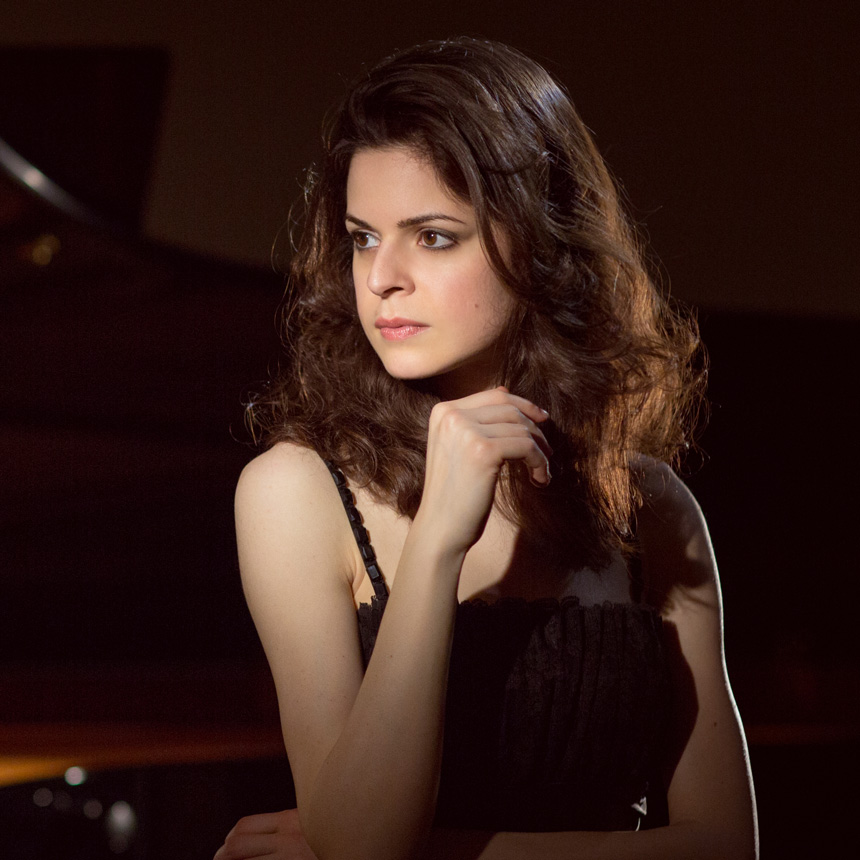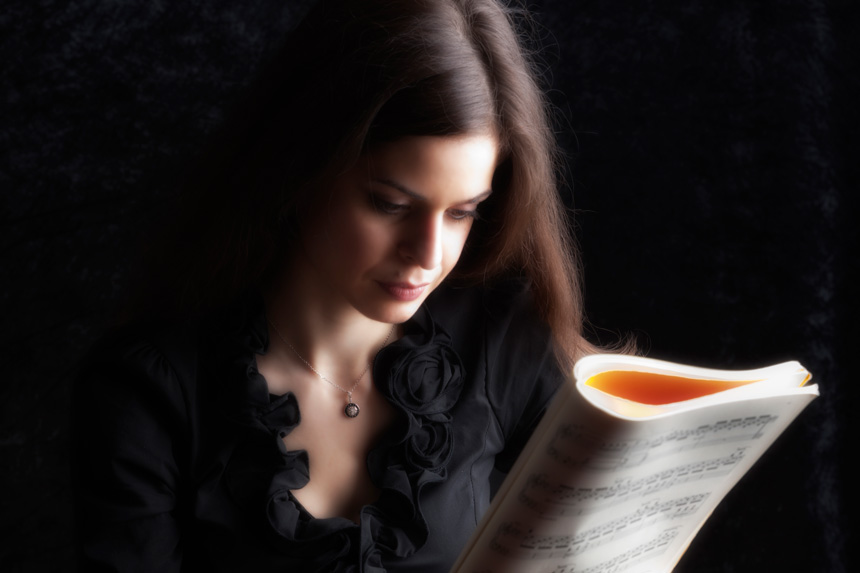Zlata Chochieva is a unique pianist of the highest calibre. From Salzburg, where she lives and teaches at the Mozarteum, she enchants music-lovers all over the world with her exceptional artistry, combining natural musical expression with outstanding and self-evident technical ability.

Photo: Vgeny Evtyukhov
Stephen Kovacevich called her ‘one of the most interesting and unconventional pianists of today’. She appears at many prestigious festivals, for example in Husum, Miami and Lucerne. This season, concert tours have taken her to the USA, Russia, England, Italy, Sweden, Mexico, Switzerland and Argentina.
Because Zlata was too young to be left at home alone, her mother took her along to her oldest brother Vadim’s piano lessons. She, too, wanted to play the piano – and her brother’s teacher, Nina Dolenko, was also sympathetic to the idea, although she had never worked with a four-year-old child before. A year later, Zlata was already appearing at small concerts in Dolenko’s class, and when she was eight she played for the first time with orchestra: Mozart’s Piano Concerto No. 17 in the Great Hall of the Moscow Conservatory. When she was twelve, one of her recitals was broadcast by Russian television, and was praised by the press. When I remark that she must have been exceptional, she laughs: ‘Oh, Russia is full of talent, there it’s quite normal.’ She no longer remembers exactly what she played on that occasion, but promises to check on the recording that she still possesses; in any case she thinks she remembers it including something by Tchaikovsky, mazurkas by Scriabin and Rachmaninov’s Vocalise.
Free
Zlata Chochieva participated in many competitions, particularly in order to gather experience of performing on stage. ‘Practising at home and the concert stage are two completely different worlds. At the Moscow Conservatory I had little opportunity to play in public, but it’s such an important thing. Competitions give you stage experience, also – above all –of playing with orchestra. In addition, competitions help you to master a large repertoire. That was a fundamental reason why I joined in. Later, though, I was no longer so happy to do so and couldn’t summon up the motivation to take part. As an artist, you have to be unique, you have to show your own face, find your own way, take risks and be allowed to be different – not average and predictable, as is expected of you in competitions.’
In this respect she was certainly supported by Mikhail Pletnev, her mentor for three years. ‘I was fourteen and it was incredible good fortune. For me, the three years of study with him were unforgettable. It’s so great to have the possibility to speak with such a great artist and extraordinary human being. There were just two of us studying in his class, and he was very demanding – for example we had to know about all types of music, orchestral works and opera. He advised us to be brave, to risk setting forth our own ideas as artists. For me this was a turning point: he treated us like artists, not like students. And therefore I felt that I could be myself; I felt free.’
Close Ties
Later she studied under Pavel Nersessian at the Moscow Conservatory and attended masterclasses with, for instance, Jacques Rouvier – who, after her second year, took her into his class at the Mozarteum and asked her to be his assistant. Today she lives in Salzburg, but spends a lot of time travelling. She still retains close ties to Moscow, where she was born and grew up, where she studied and where a lot of her friends still live. She also has close ties to Ossetia in the Caucasus because that’s where her parents come from. ‘I love it with all my heart, it’s small, interesting and very beautiful. Its culture isn’t Slavic at all; it’s more Oriental. We have our own roots, our own culture, history and language, which is derived from Sarmatian and Scythian, and our cuisine is very much out of the ordinary.’ Since 2005 she has been an Honourable Artist of the North Ossetia Republic.
Sharing
She enjoys teaching. ‘Yes, it’s a great privilege to share experiences with younger people. I myself also learn a lot from it. It’s a shared experience; you build something together. The development of a student into an artist is a very interesting process. The moment arrives when you must forget everything you have learned, when you mustn’t remain rooted in your studies, when you know that you must fly, be yourself, and take everything as it comes.’

Photo: Theo Kwant
Time and Space
She has also issued a series of brilliant CDs – including a virtually definitive interpretation of Chopin’s Second Sonata in 2005, when she was just 20, and a colourful rendition of Pletnev’s piano transcriptions from Tchaikovsky’s Sleeping Beauty. She has also recorded a very idiomatic version of Schumann’s Humoreske, as well as extremely fine Scarlatti and a very exciting account of Prokofiev’s Seventh Sonata – and, above all, Rachmaninov. Her recording of his complete Études-Tableaux was nominated for a Preis der deutschen Schallplattenkritik, and the music critic Jeremy Nicholas in Gramophone said of her disc of the Chopin Études: ‘certainly one of the most consistently inspired, masterfully executed and beautiful-sounding versions I can recall.’ In addition, numerous concert programmes testify to her special affinity with Rachmaninov’s music, whom she also admires greatly as a person. ‘Yes, nobody else can match him.’ She can’t explain why this should be the case. He’s like ‘an explosion of nature’, unique in every respect. ‘In the case of other great pianists I can tell you exactly how they play something, and why. Of course it will never be the same twice, and it should never be an imitation, but at least you can reason out what’s going on. But with Rachmaninov – and, for that matter, with Horowitz – I can’t do that. Art comes from the cosmos and cannot be grasped by our human minds and psyches. Music, in fact art in general, gives us another perspective. It lets us fly, escape from human limitations, elevate ourselves into another dimension. You must avoid any form of routine or fixed notions of certain things.’
Is there perhaps a comparison with her experience as a pilot, with flying in the literal sense, when time and space acquire a new dimension? ‘Yes, I fly a lot as a passenger to my concerts, but in the cockpit it’s a wholly different matter. I perceive time and space in a different way; you could certainly compare that with being an artist. It has given me a strange feeling that the world is far more interesting and unknown than we realize. We know so little. I hope I’ll have the chance to fly again.’
Rachmaninov himself described a similar experience when driving a car: ‘When I conduct, I experience much the same feeling as when drive my car – an inner calm that gives me complete mastery of myself and of the forces, musical or mechanical, at my command.’
In the Moment
Another great passion is Mozart. Does she also admire the way Horowitz played Mozart? ‘Yes, it’s incredible, he’s one of my favourite performers. I was too young to hear him play live, but my father was at his Moscow concert.’
For her, Horowitz and Rachmaninov are essentially great musicians, not just great pianists. ‘Not that the piano is too limited – for me the piano is the most fantastic instrument of all, because it can sing but can also attain an orchestral fullness of sound. I like listening to orchestral music and opera best. Even as a child, I spent hours listening to recordings and couldn’t get enough of the sound of the orchestra. Sometimes I regret that I don’t play another instrument as well; I’d like to learn the violin, for instance. If you play Beethoven, you have to have a string quartet or an orchestra in your mind, and similarly you can’t understand Rachmaninov’s musical language without knowing his orchestral works, songs and choral music – or The Bells, one of my favourites.’
Are The Bells a sort of icon for Russia? ‘Yes, certainly; when I think of Russia, I always hear the bells of the Russian Orthodox church, and then tears come to my eyes – it’s a powerful emotion. Now I have a piano duo with Misha Dacić; I admire him greatly, he’s a fine artist, a musician from another world. He has made a transcription of The Bells for two pianos. We gave the première at the Ivanovka estate, where Rachmaninov wrote a lot of his works.’
Zlata Chochieva is also a great fan of jazz. ‘I’m in the process of discovering it; it’s another world. Sound, timing, it’s all different. It’s incredibly refreshing to play in other styles; even in classical repertoire it gives you more possibilities, because even though I have a well-defined concept of a piece, this changes in a flash the moment I go onstage. Music is born in the moment. The concert stage is exciting, full of risk, and what we achieve there is a mixture of what we have prepared intellectually and the spontaneity that inspiration gives us.’
Author: Eric Schoones
More about Zlata Chochieva: zlatachochieva.com
 Pianist Magazine is published in seven countries, in two different editions: in German (for Germany, Austria, Switzerland, Luxemburg and Liechtenstein) and in Dutch (for Holland and Belgium).
Pianist Magazine is published in seven countries, in two different editions: in German (for Germany, Austria, Switzerland, Luxemburg and Liechtenstein) and in Dutch (for Holland and Belgium).The magazine is for the amateur and professional alike, and offers a wide range of topics connected to the piano, with interviews, articles on piano manufacturers, music, technique, competitions, sheetmusic, cd’s, books, news on festivals, competitions, etc.
For a preview please check: www.pianist-magazin.de or www.pianistmagazine.nl
from Piano Street’s Classical Piano News https://www.pianostreet.com/blog/piano-news/zlata-chochieva-as-an-artist-you-have-to-be-unique-9188/
No comments:
Post a Comment